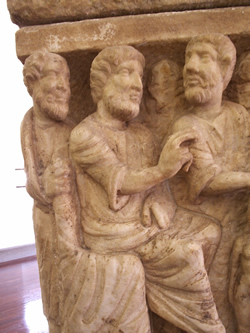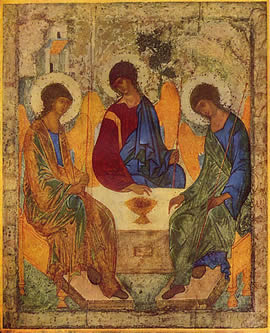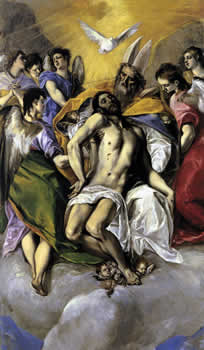From Our Archives
Michael Fitzpatrick, Ascribe to the Lord (2021), and Debie Thomas, Start with the Three (2018).
For Sunday May 26, 2024
Trinity Sunday
Lectionary Readings (Revised Common Lectionary, Year B)
Psalm 29
Romans 8: 12-17
John 3:1-17
This Week's Essay
Among Protestant and Catholic Churches in the west, the first Sunday after last week's Pentecost is Trinity Sunday. It's a day when we celebrate the triune nature of the one true God. It's also a day when we can get lost in the weeds of theological abstractions.
At my church in San Diego, you could say that every Sunday is a Trinity Sunday, since every week we confess the robustly Trinitarian Nicene Creed from the year 325 AD: "We believe in one God… The Father almighty… We believe in one Lord Jesus Christ, the only begotten son of God… We believe in the Holy Spirit, the lord and giver of life, who proceeds from the Father and the Son, and who with the Father and the Son is adored and glorified."
Many liturgies on this Trinity Sunday will include the sixth-century Athanasian Creed, that "we worship one God in trinity, and trinity in unity; neither confounding the persons; nor dividing the essence." We don't know who wrote the Athanasian Creed, but it makes important affirmations and denials.
We Christians affirm the unity and co-equality of the Godhead: we worship not only the Father, but also the Son and the Holy Spirit. We also deny two things, both tritheism — that we worship three gods; and subordinationism — that the Son or the Spirit is subordinate to the Father.
 |
|
Dogmatic Sarcophagus, 350 A.D., Vatican Museum, Rome. The earliest known depiction of the Trinity.
|
But it's here that the history of the Trinity gets interesting. Whereas our Western Churches affirm the Athanasian Creed, it has never enjoyed widespread use in Eastern Orthodoxy. This is strange, because Eastern theologians like the "Cappadocian fathers" of the fourth-century — Basil the Great of Caesarea, his brother Gregory of Nyssa, and their friend and bishop of Constantinople Gregory Nazianzus — made major contributions to the doctrine of the Trinity.
When Eastern Orthodox believers celebrate the Trinity, they start in a different place than their western cousins. And it's a good place to start when we worship God. Western theology can tend toward intellectual abstraction. Eastern theology emphasizes adoration of the mystery. In Eastern Orthodoxy, personal devotion takes precedence over theological doctrine. Orthodoxy is rightly wary of the inadequacies of human language and the limitations of the human mind when considering the infinite God.
Here are just two of many examples from Eastern Orthodoxy that we might give.
The desert father and intellectual Evagrios of Pontus (345–399), who spent the last sixteen years of his life among unlettered Coptic peasants in the harsh Egyptian desert, once observed: "God cannot be grasped by the mind. If he could be grasped he would not be God."
 |
|
Andrei Rublev, Holy Trinity, c. 1400.
|
Similarly, the Syrian monk and bishop John of Damascus (676–749) wrote in his Exposition of the Christian Faith (I.4): "It is plain, then, that there is a God. But what he is in his essence and nature is absolutely incomprehensible and unknowable. God then is infinite and incomprehensible; and all that is comprehensible about him is his incomprehensibility."
Both of the Old Testament readings this week emphasize this transcendence of God. Isaiah had a terrifying vision; the psalmist heard a thundering voice.
Isaiah feared death when he saw the holy God "high and exalted." The seraphs covered their faces, earthquakes shook the foundations, and thick smoke filled the temple. "Woe to me! I am ruined! I am a man of unclean lips, and I live among a people of unclean lips, and my eyes have seen the King, the Lord Almighty."
Psalm 29 mentions "the voice of the Lord" seven times. God's voice thunders over mighty waters, it splits the cedars, twists the oaks, and rips the bark off of trees. The psalmist compares God's voice to a bolt of lightning.
All of our thoughts about God and prayers to God live with these limits. I'm always amazed at the casual presumption of some God-talk, when passages like Isaiah 6 and Psalm 29 remind us that circumspection before the Ineffable Name should characterize our posture. A favorite poem of mine by CS Lewis captures the practical implications of God's transcendence. It's called Footnote to All Prayers.
He whom I bow to only knows to whom I bow
When I attempt the ineffable Name, murmuring Thou,
And dream of Pheidian fancies and embrace in heart
Symbols (I know) which cannot be the thing Thou art.
Thus always, taken at their word, all prayers blaspheme
Worshiping with frail images a folk-lore dream,
And all men in their praying, self-deceived, address
The coinage of their own unquiet thoughts, unless
Thou in magnetic mercy to Thyself divert
Our arrows, aimed unskillfully, beyond desert;
And all men are idolaters, crying unheard
To a deaf idol, if Thou take them at their word.
Take not, O Lord, our literal sense. Lord, in thy great
Unbroken speech our limping metaphor translate.
But God's radical transcendence is only part of what we celebrate on Trinity Sunday. God is infinite. But both the gospel and the epistle this week remind us that God is also intimate and immanent.
 |
|
The Trinity by El Greco, 1577.
|
Paul contrasts two ways of relating to God. We shouldn't relate to God as a slave who fears a master, but as a child who feels safe with a father: "Abba, Father" (Romans 8:15, Galatians 4:6). Abba is the Aramaic word used by Jesus that means something like "Papa." The word is used only three times in the New Testament, and conveys a shocking sense of human intimacy with the divine infinite. It's a word that little children first learning to speak used for their father, and that Jesus himself used to speak to God in Mark 14:36.
During the four years that my family lived in Moscow (1991–1995), we would take the overnight train to St. Petersburg. There, we could visit the magnificent Hermitage Museum, which houses Rembrandt’s Prodigal Son (1666). The painting is enormous (262 X 205 cm), and full of deep, dark reds and browns. In it, the stooping father embraces his kneeling son — with compassion, with tenderness, and without any questions about his many failures.
And that's what God is like — a compassionate father.
A few years ago a reader from Vermont sent me the poem Immersion by Denise Levertov (1923–1997). Levertov was born in Britain and moved to the United States when she was twenty-five. In 1989, during her eleven years as a professor at Stanford University (1982–1993), she converted to Christianity. Her book of thirty-eight poems The Stream and the Sapphire (1997) traces her journey from agnosticism to faith.
Immersion is just one of many of her poems that explores our human intimacy with the divine infinite.
There is anger abroad in the world, a numb thunder,
because of God's silence. But how naive,
to keep wanting words we could speak ourselves,
English, Urdu, Tagalog, the French of Tours,
the French of Haiti.Yes, that was one way omnipotence chose
to address us-Hebrew, Aramaic, or whatever the patriarchs
chose in their turn to call what they heard. Moses
demanded the word, spoken and written. But perfect freedom
assured other ways of speech. God is surely
patiently trying to immerse us in a different language,
events of grace, horrifying scrolls of history
and the unearned retrieval of blessings lost for ever,
the poor grass returning after drought, timid, persistent.
God's abstention is only from human dialects. The holy voice
utters its woe and glory in myriad musics, in signs and portents.
Our own words are for us to speak, a way to ask and to answer.
Sometimes it feels like God is silent. But maybe that's because we expect his speech to conform to our own limited language. Yes, sometimes God speaks directly and simply, like he did when he spoke to Moses "face to face." But God is also perfectly free, Levertov reminds us, and so he has "other ways of speech" and "myriad musics." I like to think that on Trinity Sunday in particular "God is surely patiently trying to immerse us in a different language, events of grace, horrifying scrolls of history and the unearned retrieval of blessings lost for ever." Like withered grass coming back to life.
For further reflection:
I like how Bartholomew I, the Ecumenical Patriarch and spiritual leader over all the Eastern Orthodox churches, captures both God's transcendence and immanence in his book Encountering the Mystery (2008): “God as unknowable and yet as profoundly known; God as invisible and yet as personally accessible; God as distant and yet as intensely present. The infinite God thus becomes truly intimate in relating to the world” (186).
Weekly Prayer
Originally from the Carmina Gadelica I, 75
Taken from Esther de Waal, editor, The Celtic Vision(Liguori, MO: Liguori/Triumph, 1988, 2001), p. 163Spirit, give me of Thine abundance,
Father, give me of Thy wisdom,
Son, give me in my need,
Jesus beneath the shelter of Thy shield.I lie down tonight,
With the Triune of my strength,
With the Father, with Jesus,
With the Spirit of might.NOTE: For sixty years the folklorist Alexander Carmichael (1832–1912) traversed Scotland's Outer Hebrides isles collecting and translating the traditions of its Gaelic-Catholic people. His eventual trove contained a little of everything — their ballads, prayers, proverbs, hymns, charms, incantations, runes, poems, tales and songs. Carmichael's labor of love was published in six volumes across seventy years as Carmina Gadelica ("Hymns of the Gael") Hymns and Incantations, With Illustrative Notes on Words, Rites, and Customs, Dying and Obsolete: Orally Collected in the Highlands and Islands of Scotland. Carmichael published the first two volumes in 1900. His daughter Ella continued the project. Volumes 3 and 4 were published by his grandson, James Watson, in 1940–1941. Volumes 5 and 6 were published by Angus Matheson in 1954 and 1971.
Dan Clendenin: dan@journeywithjesus.net
Image credits: (1) Wikipedia.org; (2) Artcyclopedia.com; and (3) Lib-Art.com.





